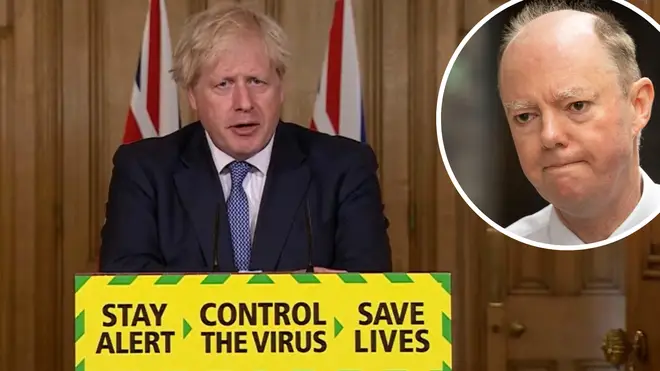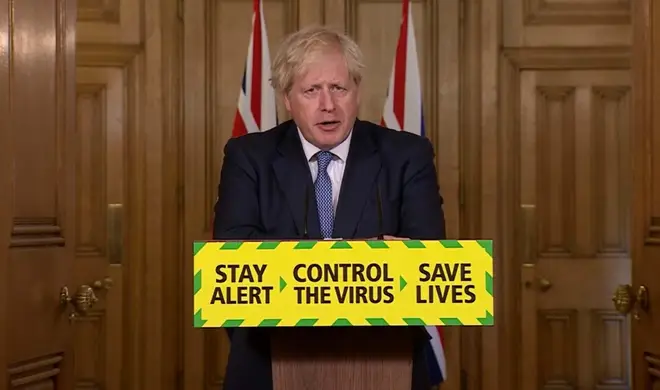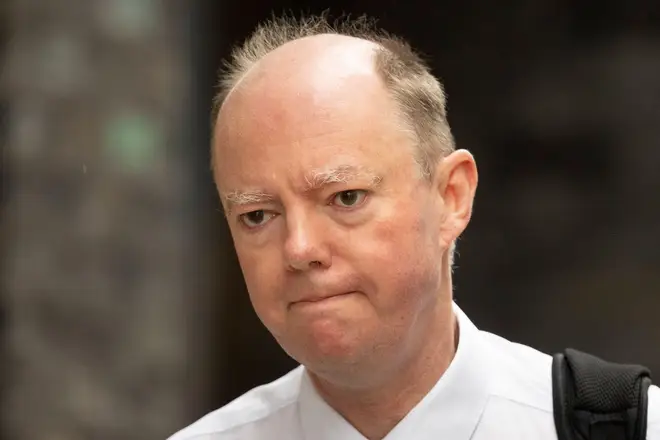
Paul Brand 10am - 12pm
6 December 2023, 00:04 | Updated: 6 December 2023, 00:12

Boris Johnson will claim he delayed implementing the first lockdown based on Sir Chris Whitty's advice when he gives evidence at Wednesday's Covid Inquiry.
The decision to delay announcing a lockdown until 23 March 2020 is expected to be a subject of intense scrutiny during Boris Johnson's appearance at the public inquiry on Wednesday and Thursday.
The Inquiry is examining evidence relating to the government's preparedness and response to the Covid-19 pandemic.
Mr Johnson is expected to tell the Covid inquiry that given the "massive disbenefits" of lockdown, it was "obviously right" to ensure it was not implemented too soon.
He is anticipated to say Sir Chris, the top medical advisor to the government, told him that getting the timing of lockdown correct was "essential" as having one too early may have led to restrictions being in place for longer than the public could deal with.
The former prime minister is expected to describe how the meeting made him realise the limits of following the science, as tackling Covid involved "complex moral and political dilemmas" only an elected politician could deal with.
On 28 February 2020, Sir Chris is said to have warned Mr Johnson about the risks of Covid during a meeting in the Cabinet Room.
This is said to have raised the prospects of a lockdown for the first time.
Read more: UK government was 'too late' to act in first wave of the Covid-19 pandemic, Chris Whitty admits
Read more: 'Old fashioned' ways are best to stay young: Chris Whitty reveals best ways to live longer
During an emergency Cobra committee meeting on 9 March, Sir Chris argued that the timing of the measures was "crucial".
He also told ministers that "public compliance or despondence" depended on the timing of the measures.
Sir Chris reportedly described the impact on school children, the economy and people's mental health and life chances.

At a press conference later that same day, Sir Chris also purportedly said: "Once we have started these things, we will have to continue them through the peak and that is for a period of time and there is a risk that if we go too early, people will understandably get fatigued and it will be difficult to sustain.”
He also allegedly advised against banning mass gatherings while advising introducing quarantine for travellers from China.
The former prime minister is also expected to say that the advice from his adviser "made sense" and "was probably correct."
Mr Johnson is expected to add: "Given all the other massive disbenefits of lockdown, it was obviously right to time the measures so as to deliver the maximum impact."

Sir Chris, Sir Partick Vallance, who was the former chief scientific adviser, and Mark Sedwill, the former cabinet secretary, have all admitted that the government should have implemented a lockdown earlier.
Former health secretary, Matt Hancock, has openly admitted that the lockdown should have been announced three weeks earlier.
Sir Chris previously told the inquiry that he wanted to minimise the loneliness and missed schooling lockdown brought.
Mr Johnson is expected to apologise to the Covid Inquiry and acknowledge the government did not get everything right during the pandemic.

Rachel Johnson and Ross Clark criticise the COVID Inquiry
However, the former prime minister will argue that his government got many of the big calls right, people close to him say.
Mr Johnson will talk with pride about the vaccine programme and argue the UK emerged from the final lockdown earlier than other comparable economies.
He is also expected to insist that all three lockdowns came at the right time and that his government saved hundreds and thousands of lives.
He will emphasise the success of the vaccine programme, with the UK breakthroughs signposting "the beginning of the end of the pandemic".
In terms of the death toll, Mr Johnson will admit the numbers are 'shocking' but that Britain "ended the pandemic well down the global league table of excess mortality".
His evidence will follow weeks of heavy criticism of him at the inquiry.